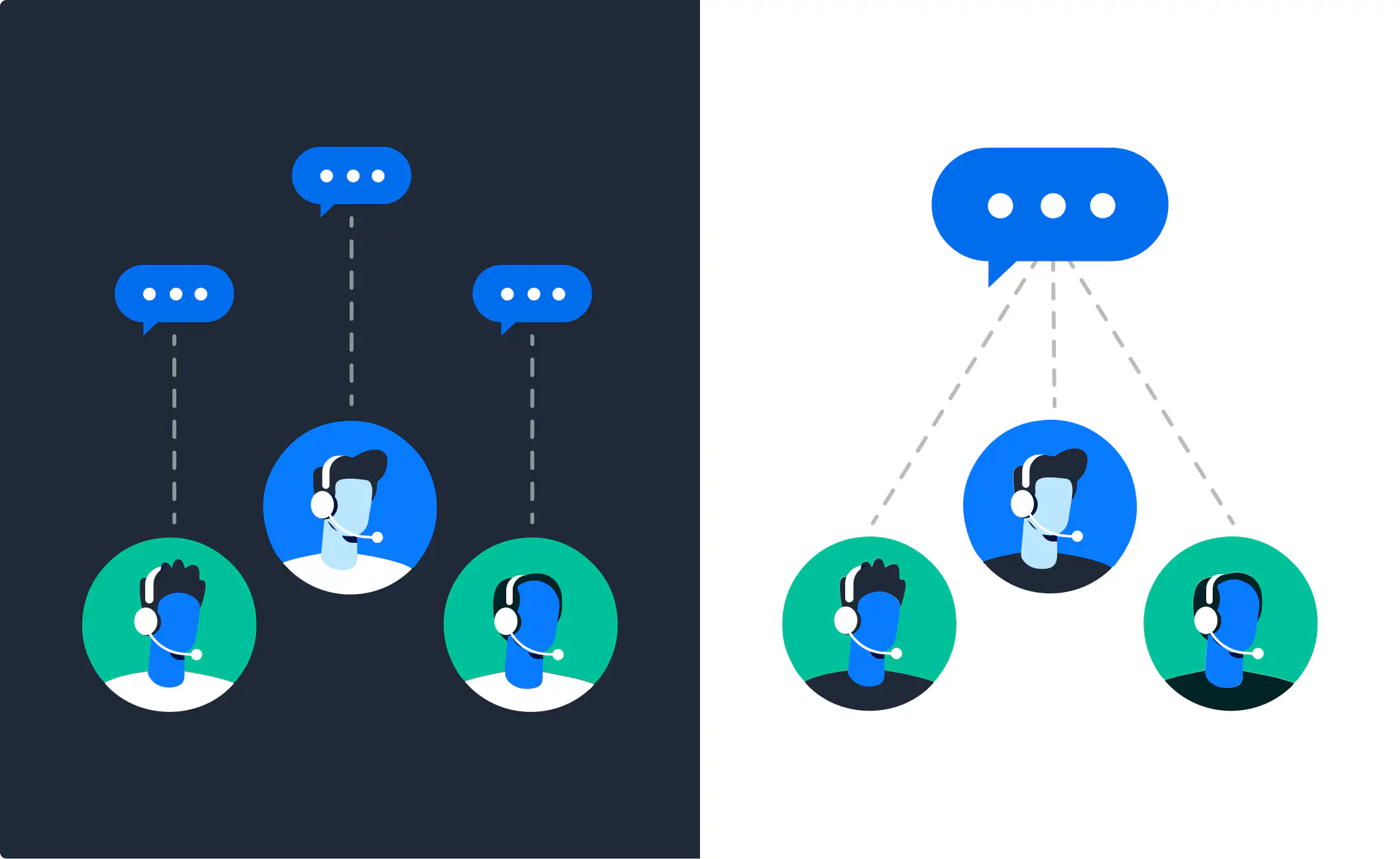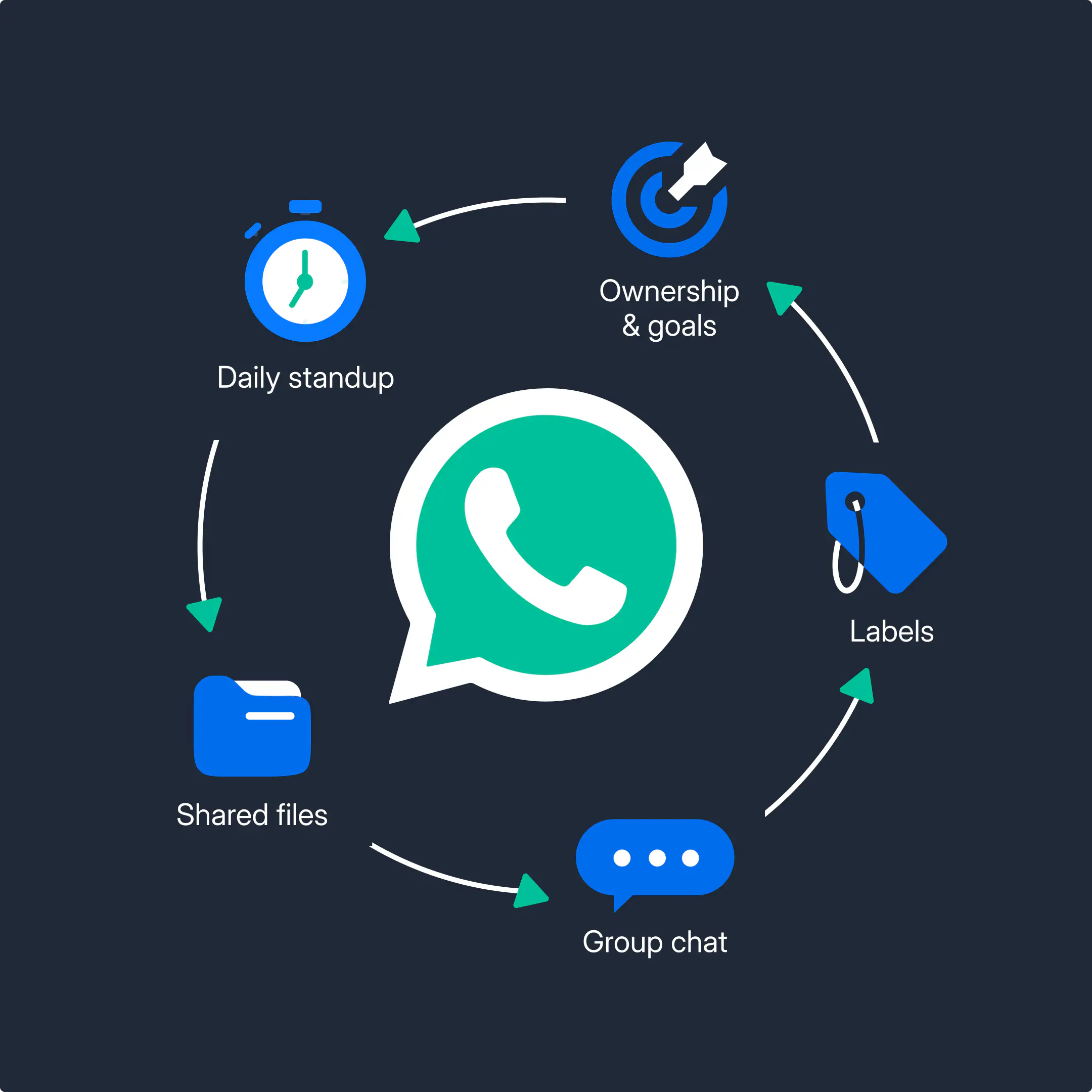5 Ways to Improve Sales Team Collaboration on WhatsApp

To improve collaboration in a sales team using WhatsApp, you need to assign leads clearly, centralize conversations, align with the team consistently, and track conversation status to stay on top of things.
These steps help you transform a chaotic collaboration into an organized workflow where everyone is clear on what’s happening and what they’re responsible for.
In this article, we’ll break down five practical ways you can improve how your sales team collaborates using WhatsApp.
Why collaboration is important for sales

When your sales team collaborates well, leads move faster through the pipeline, reps work more efficiently, and managers can step in with the right support at the right time.
But when collaboration breaks down, everything slows down:
- No one knows who owns the lead
- Reps accidentally message the same contact twice
- Handoffs to other sales reps or support team go cold, and deals fall through
- Conversations sit in private chats instead of your CRM
- Managers are left in the dark, unable to coach or optimize
In fact, 86% of employees and executives cite the lack of collaboration or poor communication as a top reason for workplace failure.
Are too many sales collaboration tools hurting your team’s productivity?

The number of tools you’re using might be affecting your sales team’s productivity. Teams often use multiple sales tools for various tasks, and when these tools are disconnected, it affects collaboration.
Sales reps need to constantly shift across tools to gain context, talk to leads, and report to managers. It’s inefficient and takes way too much time.
Here’s what a typical sales collaboration setup looks like:
- WhatsApp to talk to leads
- Slack for internal communication
- Sheets to track ownership
- Notion or Docs for templates and notes
- CRM for reporting
- Calendars and forms to manage follow-ups
Can you imagine how much time it takes for sales reps to switch between these tools multiple times daily? Not only that, but lead info lives in five different places, notes get copied manually, managers can’t see the full picture, and responses slow down.
This kind of disconnected workflow makes sales team communication harder than it needs to be. But if your team is using WhatsApp for sales, there’s a way you can fix this.
Why use WhatsApp for sales team alignment
Your team is already talking to leads on WhatsApp. Why not collaborate there too?
When you keep sales communication and internal coordination in the same place, everything moves faster. There’s no need to jump between Slack, email, and CRM just to check what was said or who’s handling what.
Using the right WhatsApp sales collaboration tools, your team can:
- Assign sales leads on WhatsApp without the confusion
- Add internal notes to conversations without the customer seeing them
- Tag teammates or escalate deals instantly
- Keep the full context visible to everyone involved
- Move faster without missing a beat
Instead of treating WhatsApp like a chat app, treat it like your team’s sales command center. It’s where the deal starts and closes.
5 Practical collaboration strategies for sales teams on WhatsApp

To collaborate on WhatsApp for sales, you need to use the app’s features wisely, and your entire team should be on the same page about who owns what and what the customer needs.
Here are 5 practical sales team collaboration strategies to help you do so.
1. Set clear ownership and goals
Collaboration starts with setting clear ownership, which means assigning leads to specific sales reps and making those assignments visible to everyone. If no one knows who owns which lead or what the team is aiming for, things fall apart fast.
Here’s how to make it work:
- Assign each lead to one rep only to avoid duplicate outreach
- Use tags or labels to mark lead status and owner directly in WhatsApp
- Make ownership visible to the whole team so everyone stays aligned
- Set shared team goals (like response time or deal value) to unify efforts
- Review performance and sales metrics together to reinforce accountability and progress
2. Create internal WhatsApp groups
Sometimes, your team needs a quick place to coordinate, ask questions, or share updates in real time, and that place shouldn’t be the CRM. Internal WhatsApp groups can help your sales team stay aligned without slowing down the workflow.
When used right, these groups act as a quick space to coordinate, especially for small to mid-sized teams already active on WhatsApp.
Here’s how to make them useful (not noisy):
- Create dedicated groups for key functions (Ex: SDRs, AEs, sales Ops)
- Use one group for daily coordination, and keep it focused on active deals
- Share quick wins, blockers, or lead updates to keep everyone in sync
- Pin key messages or templates for easy access during outreach
- Set group guidelines to avoid spamming
3. Track sales conversation status
If you can’t see where a conversation stands, you can’t move it forward. Tracking the status of each WhatsApp sales conversation helps your team stay organized and prioritize follow-ups.
Here’s how to put that in place:
- Add labels or tags to each lead (new, interested, follow-up, closed)
- Update statuses manually in a shared sheet or CRM to keep everyone aligned
- Standardize status definitions so everyone’s speaking the same language
4. Make sales data easily accessible
When important sales info is scattered across private chats, personal notes, and old email threads, it affects the way your team collaborates. They have to spend time searching, and sometimes, they need to make decisions without enough context.
When you organize your sales data and resources in one shared space, you make it easier for reps to follow up, for managers to coach, and for everyone to stay consistent.
Here’s how to do it:
- Record key interactions and deal info in your CRM so nothing gets lost
- Create a shared knowledge base where teammates can access past conversations, FAQs, and playbooks
5. Set a daily alignment meeting for coordination
Even with the best tools and systems, your team still needs space to connect live. A quick daily alignment meeting gives everyone a chance to share updates, flag blockers, and stay focused on shared goals. It’s a simple habit that prevents miscommunication and keeps deals moving.
Here’s how to make it effective:
- Keep it short (10 to 15 minutes max)
- Go over new leads, stuck conversations, and priorities for the day
- Let each rep share quick updates or ask for help
- Use the same structure every day to keep things predictable and focused
- Note key action items and follow up async when needed
How the WhatsApp Business Platform improves sales team collaboration
If your team already uses the WhatsApp Business App, you’ve probably felt its limits, especially when multiple reps are handling leads at the same time. There isn’t an easy way to collaborate, and you need multiple tools besides it just to be able to hand off a conversation from sales to support.
However, the WhatsApp Business Platform doesn’t have these limitations. It’s an advanced WhatsApp solution built for large teams, and it provides collaboration and automation features.
Here’s how it solves the most common sales team collaboration challenges:
| Challenge | How WhatsApp Business Platform solves it |
|---|---|
| Unclear lead assignment, leading to double messages or no follow-up at all | Auto-routing and access control ensure each conversation has a clear owner and each rep only accesses conversations relevant to them |
| Poor visibility where managers and teammates can’t see what’s happening in active chats | Shared inbox and CRM sync give the whole team visibility into every lead’s status |
| Messy handoffs between SDRs, AEs, and support | Internal notes and status tagging make it easy to pass context without losing momentum |
| Important conversations are scattered across devices and personal accounts | Centralized threads and role-based access keep everything in one secure, trackable place |
Conclusion
If your team is just getting started selling and collaborating on WhatsApp, the WhatsApp Business App is a great way to talk to leads directly. But as your team grows, so does the need for structure, visibility, and better coordination.
The WhatsApp Business Platform provides all of these at scale. It gives your team the tools to collaborate without switching channels or relying on too many tools.
To build a solid collaboration strategy on WhatsApp, start with the basics. Define ownership, improve visibility, and align your team. Then, when you’re ready to grow, shift from the app to the platform to support your team’s next stage.
FAQs
Rasayel enables automatic syncing of contacts, messages, tags, and conversation history so your team always has full context without manual copy-pasting.
Your sales team communication needs to be clear, concise, and empathetic. Here’s what to look for to make sure it’s effective:
- Clear messaging that’s easy for prospects to understand
- Concise responses that respect the customer’s time
- Empathy and active listening during conversations
- A feedback loop where reps confirm understanding and adapt
- Consistent performance metrics, like response time and close rates
Yes. With WhatsApp’s new coexistence feature, your team can now use both the WhatsApp Business App and the Business Platform on the same number.
This means you can:
- Keep using the app on your phone for manual replies
- Use a shared inbox like Rasayel to manage conversations as a team
- See the same messages in both places
Rasayel fully supports coexistence, so your team gets the flexibility of the app with the structure and collaboration tools of the Platform.

Hania is a seasoned researcher and content writer specializing in WhatsApp Business and its role in B2B sales and customer engagement. With years of experience creating in-depth, thought-provoking content, she combines real-life use cases and deep industry insights to help businesses leverage WhatsApp as a growth tool. Her expertise lies in translating complex research into actionable strategies, making her a trusted resource for companies looking to innovate their communication and sales processes.



